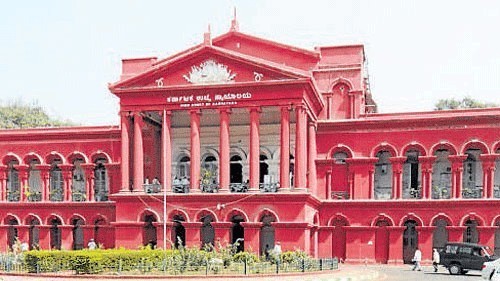
Karnataka High Court.
Credit: DH File Photo
Bengaluru: The Karnataka High Court has issued general model guidelines to the trial magistrates while dealing with release of the seized properties, either under Sections 451 and 457 of the CrPC or under Section 497 of BNSS. Justice V Srishananda said the guidelines will serve as model till the state government frames necessary rules.
The court said the rules to be framed would be in consonance with the power of the court for disposal of all the seized properties, including the electronic devices, digital devices, seized medical samples, food items, adulterated petroleum products which are highly inflammable in nature, perishable objects, precious metals like gold and silver etc. The court noticed that in a large number of matters, the seized material objects are not properly dealt with by the investigating agency and not stored in a proper manner.
The court issued model guidelines that include mahazars to distinctly identify the seized property at all stages of the criminal trial, along with the PF memo when it is placed before the trial magistrate. The trial magistrate should verify the contents of the mahazar, personally examine the seized properties and should pass a suitable speaking order if the investigating agency requests retention of the seized property.
The bench said that the magistrate must also ensure that proper infrastructure is available with the police for the preservation of the seized material objects. The judge has emphasised that unless specific grounds or reasons are provided by the investigating agency, seized property should not be allowed to be retained by them.
The court has further directed the magistrates and sessions judges to consider the disposal of property in narcotic drugs and psychotropic substances in terms of the Apex Court directions in the Union of India vs. Mohanlal and insofar as seized vehicles, the amendment to Rule 232G of Karnataka Motor Vehicles (Amendment) Rules, 2018. The court said that precious items like gold and silver should not ordinarily be retained with the investigating agency unless required for investigation purposes.
In respect of seized cash, immediate steps are to be taken to deposit the currency notes with the Reserve Bank of India, and the value of the currency notes shall be ordered to be returned to the successful party at the end of the trial, the court said. The trial magistrates have also been asked to pass suitable orders without loss of time in applications for auctioning the perishable items and directing the auction money to be kept in an escrow account subject to the final result of the criminal proceedings.
The court was hearing a petition challenging the order of the trial court rejecting the application under Sections 451 and 457 CrPC seeking interim custody of the seized articles. The case pertains to the theft at an electronic store and the police had seized stolen mobile phones, handicams and other accessories. The court allowed the application filed by the petitioner Vishal Ramesh Khatwani. The court has directed the petitioner to comply with certain conditions, including executing an indemnity bond for Rs 40 lakh.